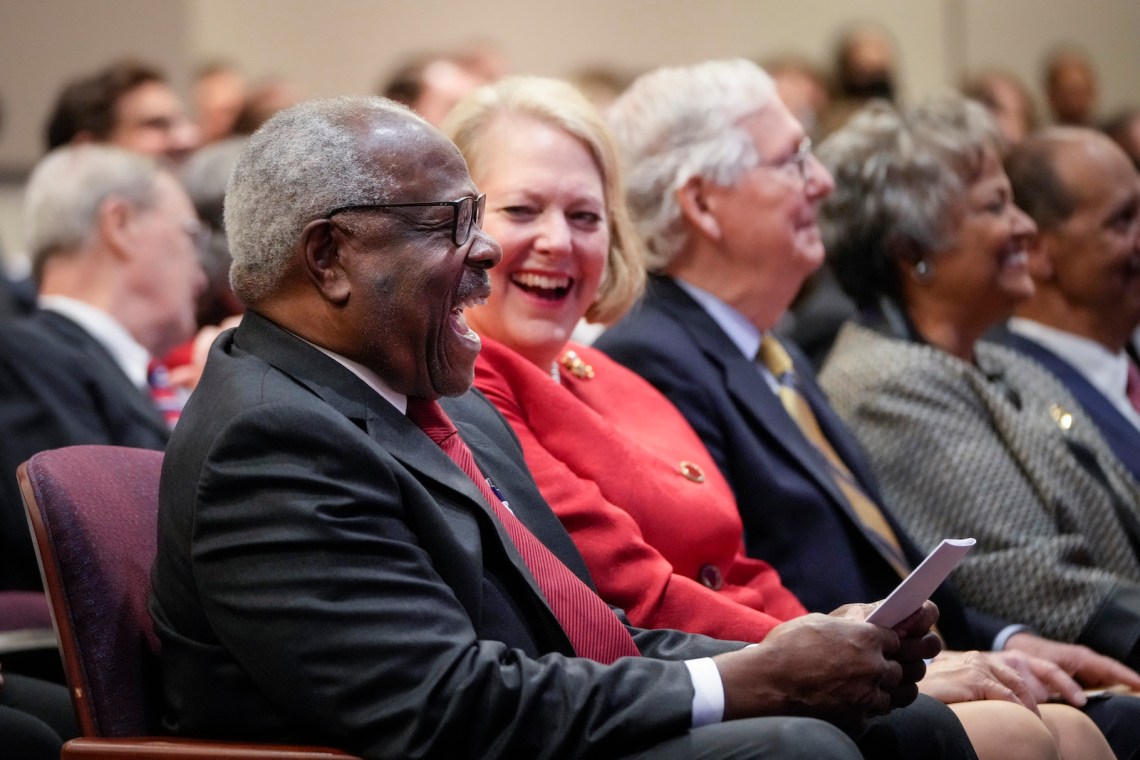Men can be measured by their real or imaginary peeves. The longer one carries them around, they more they shrink one down to the size of the continuing peevishness. Clarence Thomas has long had a deep resentment, on and off the judicial bench, against affirmative action. He was humiliated by what he considered Yale Law School’s program for favoring Black applicants, because of which he decided that his diploma “bore the taint of racial preference.” For years he wanted to get his revenge on Yale, until finally he thought of a way. In his autobiography (a common vehicle for vengeance), he said he took a fifteen-cent sticker from a store item, stuck it on the frame of his degree, and hung it in the basement. At last, after longing to all these years, he had pissed on Yale.
For someone who does not feel gratitude for favors done, Thomas, like Donald Trump, expects loyalty from those he did something for. He wrote that he got Anita Hill her job in the Reagan administration. And what was her response? In effect: “Didn’t need it, dude.” As her high school’s valedictorian, a graduate with honors from college and Yale Law, the first tenured Black faculty member at the University of Oklahoma Law School before the Thomas hearings, and a revered teacher at Brandeis to this day, she would clearly not have chafed if any school was lucky enough to do her favors.
Thomas also thought that civil rights groups were ingrates after he protected them from the insult of a favor from Yale. Their attitude was, “Thanks, but no thanks.” They could conquer prejudice well enough without his condescension.
Some favors, on the other hand, will indeed define Thomas’s legacy. He did Mitch McConnell a favor by showing how to turn the confirmation process into a greasy slide. He did Joe Biden a favor, when the latter was chair of the Senate Judiciary Committee, by pretending that Biden had not put him on the Court by suppressing key witnesses for Anita Hill. (Biden repaid him dismissively by trying to make up for this as if it were wrong—as it was.) He did Brett Kavanaugh a favor by supplying a precedent for suppressing or distorting testimony at Supreme Court nomination hearings.
He did Leonard Leo and the Federalist Society a favor by helping them reduce the American Bar Association to a bystander of their feigned search for legal scholarship. He did the National Rifle Association a favor by making the Second Amendment a door-opener for gunmen at school after school. He did Amy Coney Barrett a favor by making her look like a more respectable Catholic zealot than his wife, Ginni Thomas. She returned it by defending him against his critics, saying that no Justice is really a partisan hack. And he did Ginni Thomas a favor by claiming she was not a scavenger for Harlan Crow’s money, just an extraordinarily adhesive family friend of Crow.
In Crow—the billionaire real-estate developer and major Republican donor to the Federalist Society, with whom Thomas became close soon after his confirmation to the highest court in the land—he found someone who does not underestimate his talents but makes a valuation of them to match his own. What is that value? Directly and indirectly, as ProPublica’s new investigation has shown, in goods and services, year after year for nearly three decades, by plane and yacht, at feast and retreat, for him and his, for his allies and his causes, with cognate or cooperating other purchasers, it mounts into the millions. (So much for you, Yale, and your petty fifteen cents.) Even millions is a bargain price for a human soul. But this human soul was always purchasable at a low price.


